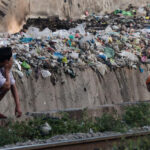
Scientists and stakeholders drawn from civil society Organizations across Africa on Thursday tasked Nigerian Government on the need to formulate policies and legislations that will guarantee food sovereignty and protect smallholder farmers across the country.
The Stakeholders who expressed optimism that Nigeria has the requisite capacity and resources to achieve self-sufficiency in food production and feed the world at large, tasked Government on the need to provide necessary infrastructure, security and good roads in order to achieve the feat.
The Stakeholders gave the charge during a one-day training for Journalists with the theme: ‘Implications of Industrial Farming in Nigeria’ held in Abuja, jointly organised by Health of Mother Earth Foundation (HOMEF), World Animal Protection, YARN, HEDA Resource Centre and Environmental Rights Action.
In her presentation, HOMEF’s Director of Programmes, Joyce Brown urged Government at all levels to take into consideration Nigeria’s food sovereignty.
“We know that the smallholder farmers, the smallholder livestock producers have been the ones feeding the nation, they produce over 70% of the food that the nation needs.
“So we are calling for more support for these smallholder farmers. We need to support our own people as opposed to giving off control of our food system, of our meat production to foreign countries whose number one interest is profits,” she said.
She argued that the decision makers sometimes take decisions to embrace some offers “from a place of not understanding completely or having all the information in regard to how far some investments like this can actually affect our people. So really, this training is to draw attention of the public, of the government, to some long-term implication, large-scale implication that investments like this can pose.
“And we shouldn’t just be looking at fixing food insecurity temporarily. We should consider as a whole the implication that investments like this can have on our food sovereignty in terms of how much rights we give to foreign corporations to control how food is produced, how our environment is managed, and what happens to our local farmers, our local animal arrears within the country. So the goal really should be food sovereignty, not just food security.”
In a paper presentation titled: ‘Industrial Animal Farming in Nigeria’, Deputy Executive Director for Environmental Rights Action, Friends of the Earth Nigeria, Mrs. Maryanne Bassey-Olsson, who warned that the incursion of foreign companies to Nigeria may further trigger challenges of insecurity, land grabbing, impact of loss of land being used by smallholder farmers and health hazards posed by the processed meats from some of the foreign companies under the guise of attracting foreign direct investment into the country.
While expressing fear over Nigeria’s food sovereignty, she posited that: “food security does not guarantee food sovereignty,” adding that: “Food sovereignty can be guaranteed if our government would do what is necessary to enable our farmers to produce more food, if there were good infrastructures, if there’s an enabling environment.
“As we know, if you live in Nigeria, there’s a lot of killings, kidnappings, especially with farmers, in farmer-producing communities and countries. So I would want our government to guarantee the lives of our farmers, make good roads, let there be infrastructures and see if these farmers will not produce our food.
“And I can assure you that we will not only produce enough to eat, we will produce enough to even export to other countries, because Nigeria can feed itself, Nigeria can feed Africa, and we can actually feed the world, because FAO has said 70% of the food that is produced in this world is actually produced by small-scale farmers.
“So I see nothing stopping us. And most of all, we have to be able to feed the world. And most of those food is produced in Africa. So I think food sovereignty is a reality and is a way to go and we can achieve it if our government really wants to.
Speaking on the challenges associated with industrial farming, Mrs. Bassey-Olsson said: “this industrial farming is different from the ranching that is proposed by the government. Industrial means it’s a confined place where the animals are kept not even in a conducive environment, it’s an uncomfortable environment. You saw in the pictures, it’s almost, the animals like are abused.
“Ranching, just that there’s a little bit of an embarkment, but they are freed. They are freed to rage around in. within limited boundaries. But in the factory farm, they are put almost in chains. They are restricted. Imagine a pig that is supposed to be in the swamp, in the mud, is put in a store, in a house. That is not a natural habitation for a pig or a chicken that should roam about in it.
“So we are not saying that you cannot have ranch. We are saying we don’t want factory farming because these are not the natural conditions animals should be kept. Who would want to eat food that is produced in a lab or something? Because they are laced with antibiotics.
“This is large scale and it’s an investment. So they need to make their money and they want minimal cost. So they will do all it takes to cut costs so they can get this meat produced in a very cheap, sometimes in an unhealthy manner. Go and look at anywhere in the world where they have factory farming. You see people condemn it. For the past years, I’ve joined colleagues in Germany to protest and demonstrate against factory farming. It is not where we want to go to at this point. That is not how we eat in Africa. We eat healthy food. People go in there, you see, they kill one or two cows in there and they say it is gone.
“We don’t keep our animals in a restrained and a very cruel environment. So we’re not saying do not have ranch. We are saying this factory farming, look at it. Where are they going to get the land? Which EIAhas been sourced from? And we are talking about factory farming. There are other elements to it.
There is there is environmental implication, there is the health implication. There is even the socioeconomic implication. What would happen when you start feeding with antibiotics? They end up in our plates because as you give them the antibiotics, we are going to be eating these animals.
She explained that there are researches and documentary evidences recorded by the World Animal Protection and International Guardian of “reported abuses by this company. And they have been guilty of tax evasions and other abuses. So we are saying, please hold the brakes for now. Do your due diligence on this company. Find out from their country of origin. Find out from other countries where they are established. Get information. Get intelligence.
“What has happened? How have they conducted business? Because once you open the door, it will be difficult to explain it. So now that they are coming, let’s ask the right questions. It should be our people over and above profits. Nigerians’ lives matter.
“Yes, we are not anti-investment. But I said investment should not be at the cost of the lives of Nigerians or the animals or the food that we eat. Go to the hospitals now. A lot of people are suffering from allergies. Don’t we think that people are responding to what has been done to the food, not just that they are hereditary or diseased.
“So we are saying for the sake of our people, for the sake of our environment, please do due diligence.
Also speaking, African Director for World Animal Protection, Mr. Tennyson Williams said: “Our position is clear. Industrial farming, we must transform it. We must do it. We must do it. transition from it to a just equitable, humane, and sustainable farming system. That is a very clear message, and we have very good reasons for that.
“Factory farming has been identified by us with facts and figures, research evidence that it is the new climate culprit. What does that mean? You and I know for far too long the conversation on climate and climate problems, related problems, has been centered around fossil fuels.
“But with factory farming, and taking JBS as an example in that context, an agency whose contribution to carbon emission is documented around 421 million tons in 2021, that is more than a country can emit. I think you need to pay attention to that. What we are facing now is not a joke. The distance between the sun and the earth, 90 million kilometers, has increased to 152 million kilometers, and this is why we see these weather patterns. So we got to be aware.
“Yes, the argument is that Africa is on the receiving end, but we cannot make that worse by bringing JBS without necessarily having a serious conversation, a conversation that puts food systems in the hands of ordinary Nigerians to make a choice.
“I don’t think that is too much to ask for. Food sovereignty is not too much to ask for. For God’s sake. No one is against big investments. $10 billion is not even enough to drive Nigeria’s food security requirements. But let it come in a manner that does not drive people out of land because somebody’s making a decision on their behalf.
“As far as I’m concerned, and as far as our organization is concerned, putting the decision-making on matters food in the hands of someone else. Yes. It’s disempowering. Yes. So let’s get that clear. And there is a bigger interest here. JBS is not second-guessing the decision to come to Nigeria. It’s a clear strategy. It’s a plan. Because gaining entry into Nigeria, my country, Sierra Leone, will be captured.
“So we have to understand this. Yes. So when the climate conference is coming up in Belém, Brazil, in November, countries are supposed to have developed national borders, determined contributions, which you can otherwise call national plans as to how they intend to respond. So that platform has to also be utilized in a way that suggests people have information.”
ALSO READ TOP STORIES FROM NIGERIAN TRIBUNE
WATCH TOP VIDEOS FROM NIGERIAN TRIBUNE TV
- Let’s Talk About SELF-AWARENESS
- Is Your Confidence Mistaken for Pride? Let’s talk about it
- Is Etiquette About Perfection…Or Just Not Being Rude?
- Top Psychologist Reveal 3 Signs You’re Struggling With Imposter Syndrome
- Do You Pick Up Work-Related Calls at Midnight or Never? Let’s Talk About Boundaries






